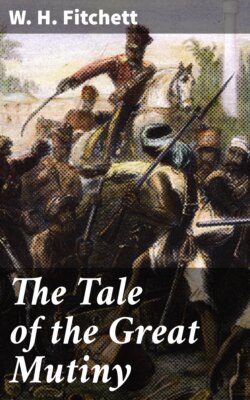The Tale of the Great Mutiny

Реклама. ООО «ЛитРес», ИНН: 7719571260.
Оглавление
W. H. Fitchett. The Tale of the Great Mutiny
The Tale of the Great Mutiny
Table of Contents
CHAPTER I. MUNGUL PANDY
CHAPTER II. DELHI
CHAPTER III. STAMPING OUT MUTINY
CHAPTER IV. CAWNPORE: THE SIEGE
CHAPTER V. CAWNPORE: THE MURDER GHAUT
CHAPTER VI. LUCKNOW AND SIR HENRY LAWRENCE
CHAPTER VII. LUCKNOW AND HAVELOCK
CHAPTER VIII. LUCKNOW AND SIR COLIN CAMPBELL
CHAPTER IX. THE SEPOY IN THE OPEN
CHAPTER X. DELHI: HOW THE RIDGE WAS HELD
CHAPTER XI. DELHI: THE LEAP ON THE CITY
CHAPTER XII. DELHI: RETRIBUTION
CHAPTER XIII. THE STORMING OF LUCKNOW
INDEX
Отрывок из книги
W. H. Fitchett
Published by Good Press, 2021
.....
Sir Richard Temple, whose task it was to examine the ex-king of Delhi’s papers after the capture of the city, found amongst them an immense number of letters and reports from leading Mohammedans—priests and others. These letters glowed with fanatical fire. Temple declared they convinced him that “Mohammedan fanaticism is a volcanic agency, which will probably burst forth in eruptions from time to time.” But were Christian missions any source of political peril to British rule in India? On this point John Lawrence’s opinion ought to be final. He drafted a special despatch on the subject, and Sir Richard Temple, who was then his secretary, declares he “conned over and over again every paragraph as it was drafted.” It represented his final judgment on the subject. He held that “Christian things done in a Christian way could never be politically dangerous in India.” While scrupulously abstaining from interference in the religions of the people, the Government, he held, “should be more explicit than before”—not less explicit—“in avowing its Christian character.”
The explanation offered by the aged king of Delhi, is terse, and has probably as much of truth as more lengthy and philosophical theories. Colonel Vibart relates how, after the capture of Delhi, he went to see the king, and found him sitting cross-legged on a native bedstead, rocking himself to and fro. He was “a small and attenuated old man, apparently between eighty and ninety years of age, with a long white beard, and almost totally blind.” Some one asked the old king what was the real cause of the outbreak at Delhi. “I don’t know,” was the reply; “I suppose my people gave themselves up to the devil!”
.....